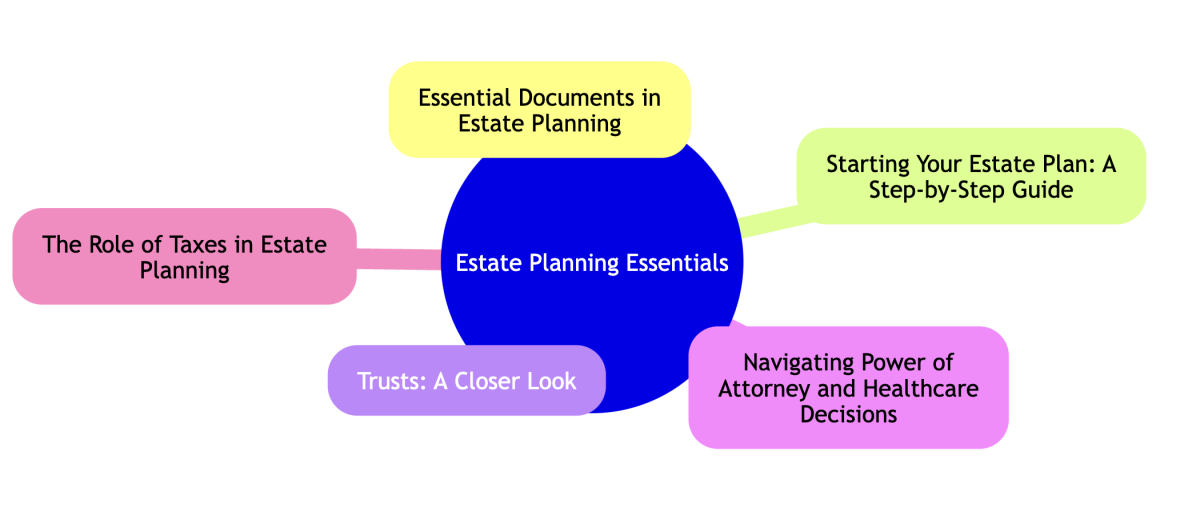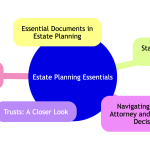Intro to Estate Planning
An estate plan is a collection of legal documents that honor your wishes and ensure that your loved ones are cared for after you're gone.
The Estate Planning process involves compiling several critical documents that dictate how your assets should be managed and distributed, who should make decisions on your behalf if you're unable, and how your healthcare preferences should be handled in case you cannot express them yourself.
For the best estate planning Montana has to offer, give the folks at Montana Elder Law a call!
Key Takeaways
- Importance of having a will regardless of estate size.
- The role of trusts in avoiding probate and managing minor beneficiaries.
- Powers of attorney and healthcare directives protect decisions on your behalf.
- The impact of estate, inheritance, and gift taxes on your estate.
- Regular updates to your estate plan are crucial post life events.

Essential Documents in Estate Planning
An effective estate plan is built on a foundation of essential documents, each serving a unique purpose in ensuring your assets and health care wishes are handled according to your preferences.
- Wills: Define asset distribution and guardianship.
- Trusts: Avoid probate and manage specific asset distribution conditions.
- Powers of Attorney: Legal authority in financial and healthcare decisions.
- Healthcare Directives: Preferences on medical treatments and end-of-life care.
- Tax Planning Documents: Strategies to minimize estate, inheritance, and gift taxes.
Each of these components plays a role in a comprehensive estate plan.
By carefully preparing these documents, you can make sure that your estate is managed and distributed in alignment with your wishes, potentially saving your loved ones time, money, and stress during a difficult period.
Starting Your Estate Plan: A Step-by-Step Guide
Taking a methodical approach to estate planning is recommended.
We all want peace of mind, and approaching something this important and complex can be intimidating.
(This is where estate planning attorneys are valuable.)
They provide clarity and guidance through legal complications, making sure nothing is overlooked.
Early preparation can significantly simplify the legal and financial processes for your heirs.
Moreover, a well-crafted estate plan can help minimize potential conflicts among beneficiaries.
To begin, follow these clear steps:
- Inventory of assets and liabilities - Catalog everything you own and owe.
- Family member and dependents identification - List all immediate family members and dependents to ensure their needs are met.
- Decision on necessary directives and documents - Determine which legal documents you need, including wills, trusts, and healthcare directives.
- Beneficiary designations - Clearly specify who inherits your assets.
- Understanding state laws and tax implications - Familiarize yourself with your state's laws and how taxes might affect your estate.
Trusts: A Closer Look
Types of Trusts
Trusts are powerful tools in estate planning, allowing for more control over asset distribution. Let’s explore the differences:
- Living vs. Testamentary Trusts: A living trust is active during your lifetime, whereas a testamentary trust takes effect upon your death.
- Revocable vs. Irrevocable Trusts: Revocable trusts allow you to make changes any time, while irrevocable trusts are fixed and cannot be altered once established.
Advantages of Using Trusts
Trusts offer significant benefits, making them a popular choice for many:
- Avoidance of probate, saving time and money
- Enhanced privacy, as trusts are not public records
- Greater control over when and how your assets are distributed
- Protection of assets from creditors and legal challenges
- Flexibility and peace of mind, knowing your estate is planned according to your wishes
Power of Attorney and Healthcare Decisions
Appointing a Power of Attorney is a great step in managing your affairs if you're unable to do so yourself.
It allows a chosen individual to make important decisions on your behalf, covering both financial matters and healthcare concerns. This process safeguards your interests and maintains continuity in decision-making.
Healthcare decisions are equally beneficial in estate planning.
Tools like living wills, healthcare proxies, and advance directives give you control over your medical care.
They specify your treatment preferences and appoint a trusted individual to advocate for your health care wishes if you're incapacitated.
The Role of Taxes in Estate Planning
Taxes are a significant consideration in any estate plan.
Estate, inheritance, and gift taxes can all diminish the value of your estate, affecting how much your heirs receive.
Strategically planning for these taxes involves understanding their nuances, including exemptions, rates, and the specific rules that might apply based on location.
Tax Implications Overview
- Estate Tax: Impacts estates exceeding certain value thresholds, with rates varying by jurisdiction.
- Inheritance Tax: Levied in some states on assets passed to heirs, with exemptions for close relatives in many cases.
- Gift Tax: Applies to transfers made during your lifetime, with annual exclusion limits and lifetime exemptions.
Parting Words from Your Trusted Estate Planning Attorney
Crafting a thorough estate plan offers peace of mind for seniors AND families. With one, you’ll know your wishes will be respected and your loved ones taken care of.
It's about making informed decisions today to protect your interests and those of your heirs tomorrow.
Montana Elder Law is a trusted authority in estate planning, offering expert advice and comprehensive solutions to folks all over Montana.
With our guidance, creating a robust estate plan that addresses all aspects, from document preparation to tax planning, becomes a simple, straightforward process. Call today!



















